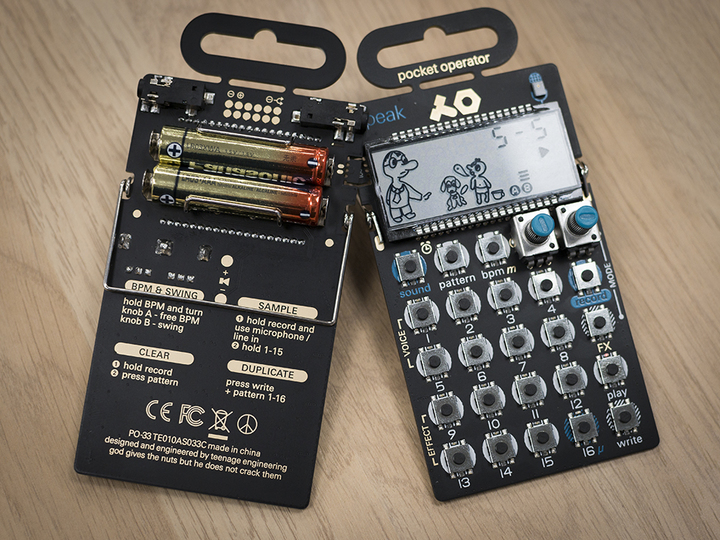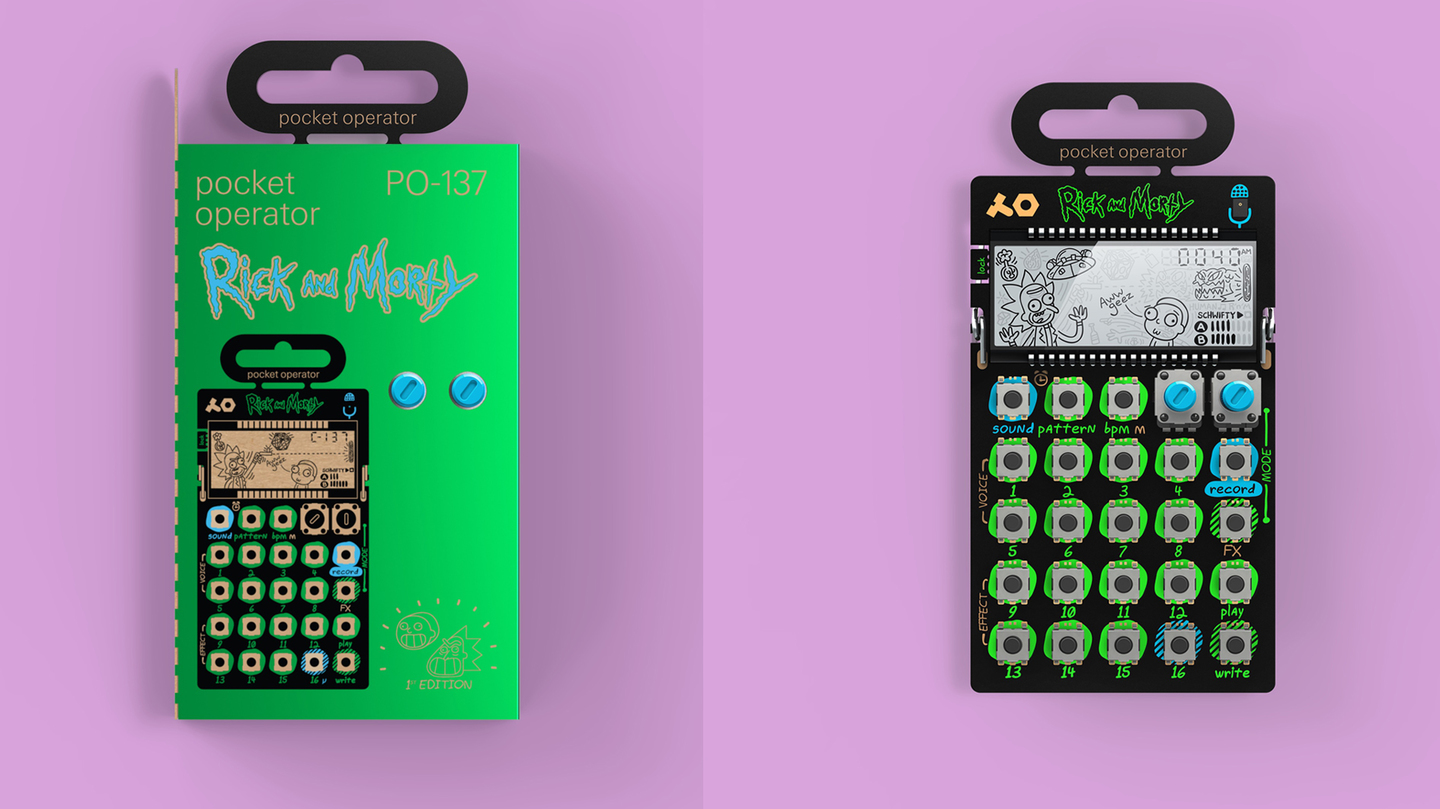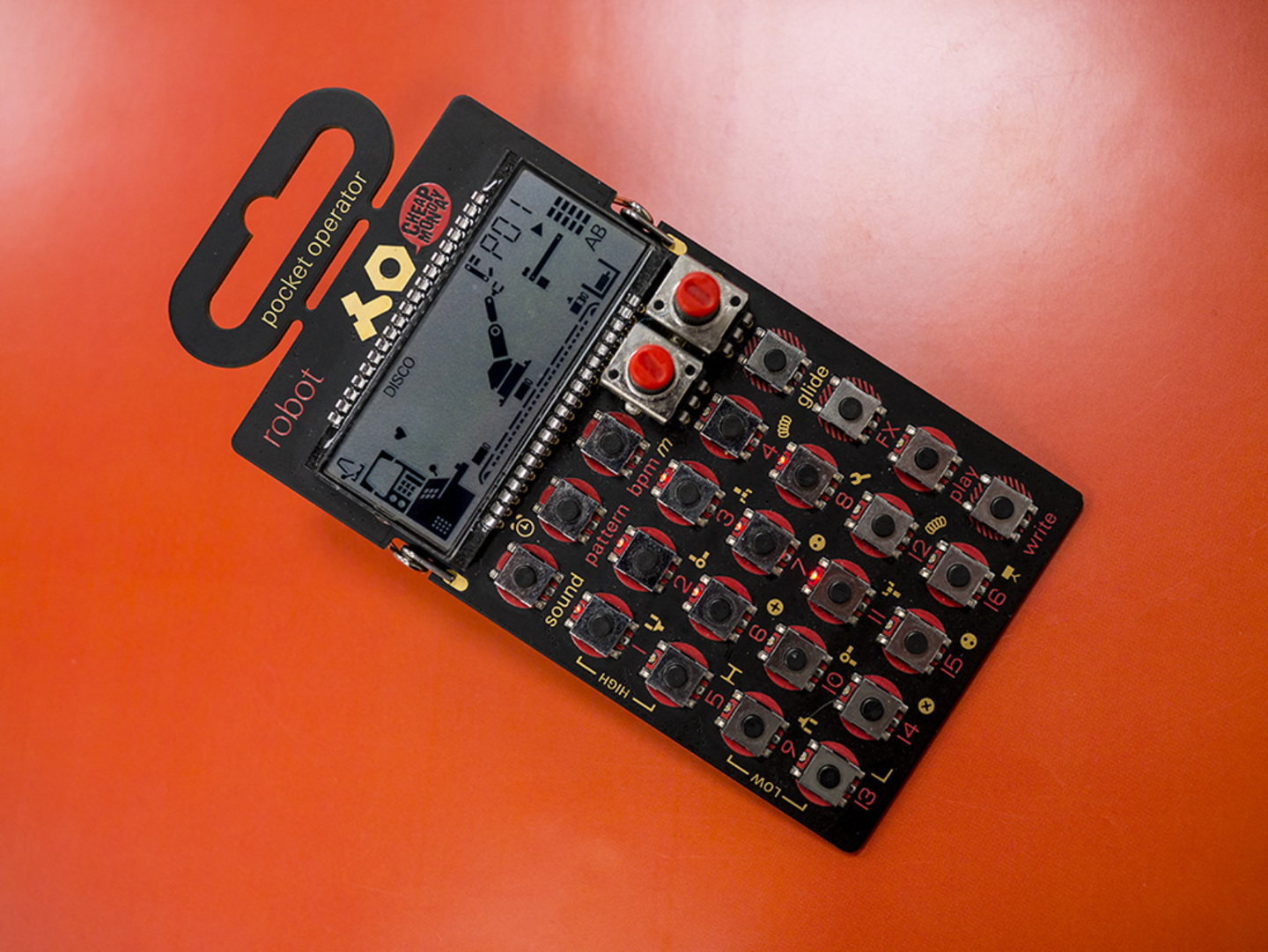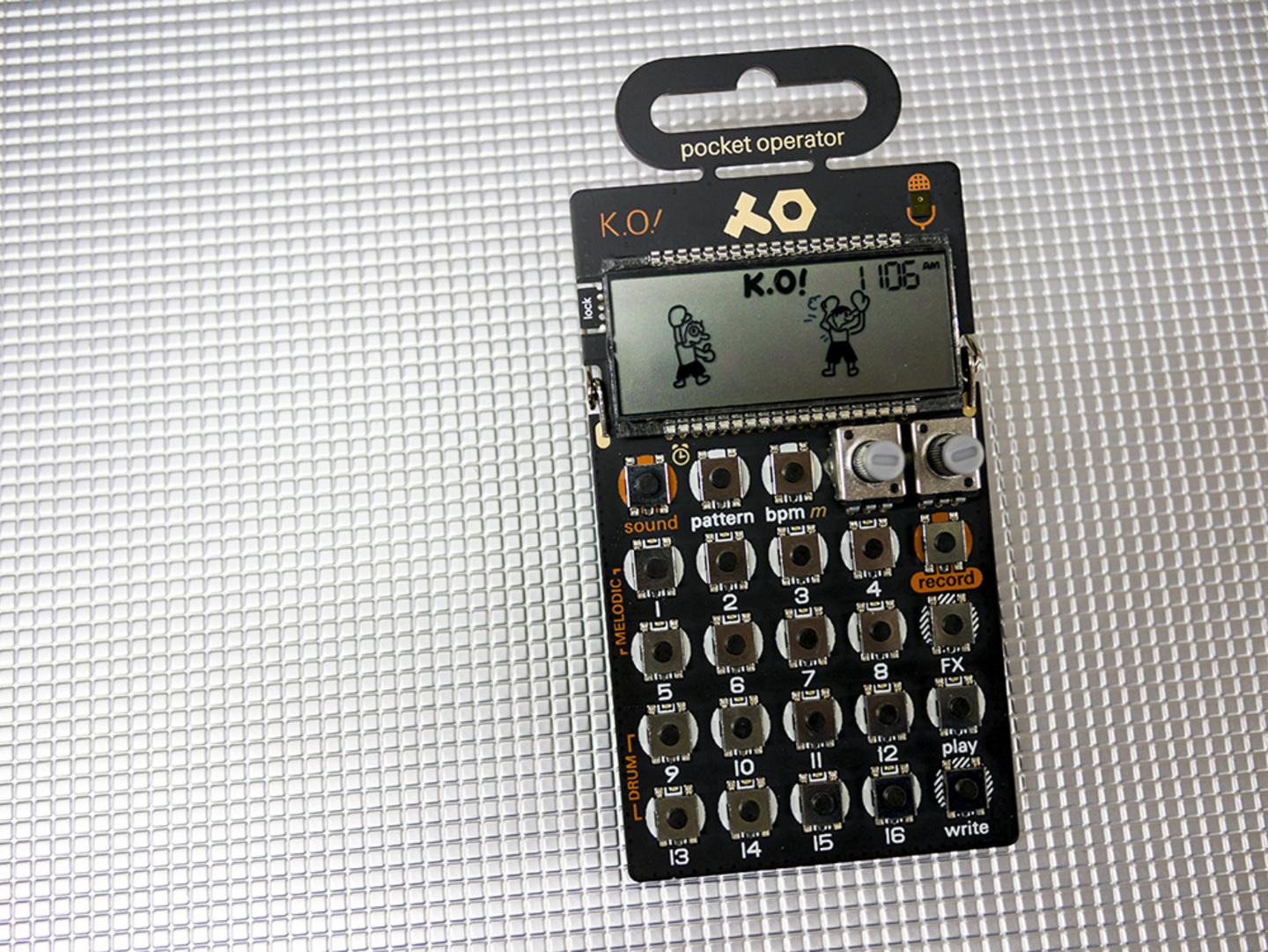
But with 10 to choose from, how do you know which is going to be right for you? Do you start with the sub, tonic, or arcade? And how do you navigate all those controls? Lucky we’re here to help you out! This guide will take you through everything you need to know about Pocket Operators and help you get to know each one a little better.
Let’s start with the basics of what a Pocket Operator is. Each one is a miniature programmable sequencer with a bunch of built in sounds and effects. They are all the same physical size, shape and layout. The colour scheme and unique display assigned to each one is what sets them apart. Despite differences in their functionality, the general workflow of every Operator is very similar. The thinking is, if you learn how to use one Operator, the rest should make a lot more sense.
Pocket Operators are very much the bare essentials of an electronic instrument. Each one is a PCB board loaded with buttons, knobs, and a screen. They have no outer casing as standard, but you can purchase the silicone pro case for an added layer of protection. The DIY vibe keeps cost down, and also encourages experimentation (especially for those handy with a soldering iron). The packaging is an eco-friendly card wrapping with a hanger built into the PCB. They also come with a kickstand to keep them well balanced on surface-tops.
Pocket Operators are very efficient and only require a small amount of power to run. Snap 2 x AAA batteries into the back of the unit and you’re ready to go! You could leave one playing constantly and it would take up to a month to run the batteries flat. When in standby, the batteries should last for up to 2 years. 2 years! This is pretty handy, as the only way to fully switch off a Pocket Operator is to take the batteries out (and those batteries are in there very securely!)

There are 2 x 3.5mm stereo jack sockets on the back of every unit. As you look at the front of an Operator, the socket on the left is for sync / audio in and the one on the right is for audio ouput to headphones or other devices. Behind the screen there is also a tiny speaker, so you don’t even need plug it in to jam. The PO-30 series Operators also have a built in microphone. This is located on the front of the unit above the screen. On the K.O! And speak models these can be used to capture audio. The tonic only uses the mic for data transfer (which we will cover later.)
You can tempo sync Operators by connecting the output of one unit to the input of another. The synchronisation settings allow you chain together as many as you like (configurations can be found in the Pocket Operator guides on Teenage Engineering’s website). A stereo cable between 2 Pocket Operators carries 2 signals. The sync signal flows through one channel, aligning the tempo of each connected unit. The audio passes through the other channel and travels through to the output of the last Operator in the chain. Pocket Operators can also be linked up with other hardware that outputs sync signal, such as the Teenage Engineering OP-1.

At first glance, there are quite a few buttons and controls to get to grips with. So here are some general tips and important bits that you should know:
There are 16 key buttons, labelled 1-16. These act as sequence steps, notes and pattern slots depending on how you use them with the function buttons.
There are 7 function buttons. As standard, every Operator has 'sound', 'pattern', 'bpm', 'play' & 'write'. The other 2 buttons vary from unit to unit, but are normally used for 'fx' / 'style' and another special function. These buttons are usually pressed in combination with others to change the behaviour of the unit.
2 parameter knobs, A (left) & B (right) are located below the screen on the right of the unit. They are used to modify parameters such as pitch, decay, bpm & swing etc. The targeted parameters depend on the mode that you're in or the sound you have selected.
The screen sets a scene with animations that move and groove to your sequences. It also displays some useful parameter information. The ‘write mode’ indicator is one of the most useful items on your display. It's worth noting is location, as this changes from unit to unit. Other than looking at the manual, the best way to find it is to toggle the 'write' button and observe where it appears / disappears from. Knowing whether you're in 'write' or 'perform' mode will always be useful, as you don’t want to accidentally overwrite your work!
There is no dedicated volume control! To adjust the output level of a Pocket Operator, you need to hold ‘bpm’ and press any button between 1-16, with 1 being the quietest and 16 being the loudest.

The structure of patterns and sequencing on Pocket Operators can be broken down as follows:

Once your patterns are taking shape, you can spice them up with some audio effects. These are activated by holding 'fx' + holding buttons 1-16 while a sequence is playing. The range of effects on each Pocket Operator is slightly different. Typical effects that crossover include retriggers, filtersweeps, bitcrush and distortion. All of these effects apply globally to your sequences and can be automated on/off.
So there you have it, a brief run down of Pocket Operators. Hopefully we've covered enough for you to get started. If we have missed anything or you find yourself getting stuck, teenage engineering’s guide section provides comprehensive instruction on each one.
As the title says, this really is the ultimate PO video!
Published in December 2020, this video captures the amazing creativity of all 9 Pocket Operators, and speaks volumes about these fantastic hands-on gadgets!
Discover everything there really is to know about the entire Teenage Engineering Pocket Operator range via the video below.
Interested in knowing which Pocket Operators sound best together? We recently published a series on YouTube called PO-COMBOS that helps you decide which PO's to mix and match!
Stretching over 9 episodes and featuring all the usual suspects, this fantastic and creative series highlights the magic of syncing multiple Pocket Operators together. We mix and match PO's and create amazing musical fusion and you can join in too!
Be sure to dive right in with episode 1 below!

The latest offering from Teenage Engineering in the Pocket Operator world is the insanely cool and creative Rick & Morty limited edition PO-137!
The collaborative PO-137 features custom Rick and Morty graphics and exclusive voice samples from Justin Roiland. In this video, we explore some of the sounds and features on this crazy little contraption. Complete with matching accessories, including case, audio cable and case, all of which can be viewed here.

The PO-133 Street Fighter is a micro sampler with 40-second sample memory and a built-in recording microphone. Comes with samples based on the Capcom Street Fighter game series.

The PO-128 Mega Man is a live synthesizer and sequencer based on the Capcom Mega Man game series, with parameter locks, glide control and punch-in effects.
In this special episode of PO-COMBOS, we have 2 brand new Pocket Operators designed in collaboration with world-renowned games company Capcom. We put the two side by side to do battle! What you're hearing is the original factory patterns and sounds, with some PO FX thrown in for good measure. Both are synchronised using the Pocket Operator Modular POM-16 keyboard / sequencer.
Who won this round?!

The PO-12 is a Rhythm Synthesizer. This mini drum machine comes loaded with 15 individual percussion sounds and a supplementary bass synth (located on sound slot 16). Each percussive sound can be tweaked using the parameter knobs. 'A' adjusts pitch while 'B' morphs the character of the sound. A step multiplier within the sequencer lets you retrigger individual steps, making snare rolls and hi-hat flutters super easy! If you like your beats, this is the one for you.

The PO-14 is a Bass Synthesizer. The sub is loaded with monophonic bass sounds. They range from deep clean bass tones through to madly distorted ones. It’s also equipped with a monophonic drum machine on slot 16 to mix in beats with your bass sounds. The ‘style’ button adds global FX to your whole sequence, while the ‘key’ button mixes in variations to your bassline. It definitely feels like they've put a bass booster in this one.

The PO-16 is a Melody Synthesizer. 'Melody Synthesizer' means plenty of lead synth sounds. These a number of FM, Wavetable and String Modelling synth engines. Like with the sub, a drum machine slot has been included to help develop a beat around your melody. Sequences are easily modulated, arpeggiated, transposed and stuttered with the key button. For adding top-line melodies, this Operator is ideal source of inspiration.

The PO-20 is an Arcade Synthesizer. If you’re looking for the sound of retro gaming, this Pocket Operator has it. Each sound slot is loaded with bleeps, cracks and pops of 8-bit consoles. All sounds correspond to a set chord, which is selected using the ‘chord’ button & number buttons. This means everything you play in key. This is great for developing song progressions, as chords can be sequenced chained together individually of patterns. There are 16 arcade style fx to go with it, our favourite of which is on button 16 - power up!

The PO-24 is a Noise Synthesizer. This might seem like a less inspiring theme compared to the arcade. However, the office has got some pretty weird and wonderful sounds to offer, which we think you’ll enjoy. The first 8 sound slots contain sounds of the office - think mouse clicks, disk drives and printers. You can create a cacophony of rhythmic texture. Slots 9-16 are loaded with some strange dissonant synth sounds. On it's own, this Pocket Operator sounds pretty experimental. Combined with something like a drum machine, it provides a real edge to your sound.

The PO-28 is a Performance Synthesizer. This Pocket Operator puts more emphasis towards jamming live. Like the others it runs sequences and patterns, but it also has a separate lead voice you can play using 1-16 as notes. This live synth voice is unaffected by the sequences and fx programmed underneath it. When held, the 'glide' button activates a pitch bend effect. If you want to go out there and perform, make sure you have the robot.

The PO-32 is a Drum & Percussion Synthesizer. The Tonic is a drum machine like the Rhythm. Each drum sound is tweakable, but unlike other operators you can also entirely replace the sound in each slot using Sonic Charge’s Microtonic Plugin. Microtonic is a drum synthesizer which allows you to craft electronic percussion from scratch. Using audio to transfer data, you can send patches between PO-32s and your Computer. The expandable features of this Pocket Operator make a much more powerful music making tool.

The PO-33 is a Micro Sampler. Using the built-in microphone or 3.5mm line input, you can use the K.O! to record and manipulate external sound sources. The onboard memory allows you to capture up to 40 seconds of audio. Slots 1-8 are melodic, meaning a sound recorded here are pitched across buttons 1-16. Slots 9-16 are drum kit samplers, which split the recorded audio into slices across the keys. You can adjust pitch, volume, sample start/end and filtering. This Pocket Operator is great for transforming the ordinary into the extraordinary and is definitely one of our favourites.

The PO-35 is a Vocal Synthesizer. Like the K.O! you can record audio sources with the mic/line-in. However, rather than capturing audio, it records ‘speech parameters’ like pitch, envelope and formant. It then reproduces this information using 8 different voicing algorithms. You can manipulate the these parameters to change the character of the voice playback. The result - strange vocoder sounds, auto-tune effects and robot voices. A single instance of tonic is included to help you out with a beat.
| Andertons | Brand Page |
| Gear4Music | Brand Page |
| Guitar, Amp & Keyboard Centre | Brand Page |
| Juno | Brand Page |
| Music Matter | Brand Page |
| Professional Music Technology | Brand Page |
| Rub A Dub | Brand Page |
| West End DJ | Brand Page |
For further information on the Pocket Operators, please visit our product page
Also, check out our blog post on the new PO-33 & PO-35
This new blog is presented by the team at Sound Technology Ltd, a leading distributor of musical instruments and pro audio equipment in the UK and ROI.